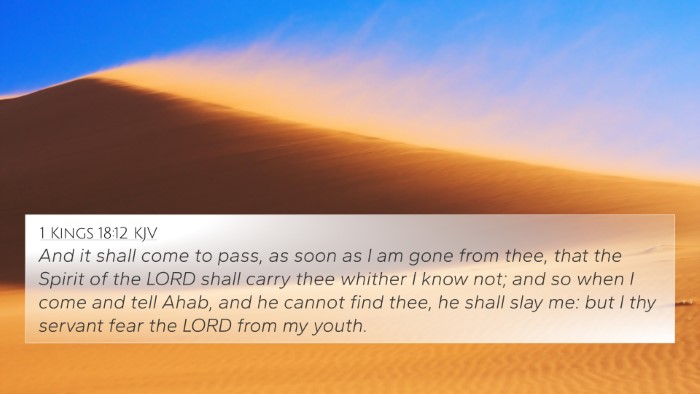Understanding 2 Kings 2:16
Verse: "And they said unto him, Behold now, there be with thy servants fifty strong men; let them go, we pray thee, and seek thy master; lest peradventure the spirit of the Lord hath taken him up, and cast him upon some mountain, or into some valley. And he said, Ye shall not send." (2 Kings 2:16, KJV)
Summary and Meaning
The request made by the servants reflects their deep concern for the prophet Elijah after witnessing his miraculous ascent into heaven. They suggest sending fifty strong men to search for Elijah’s body, as they feared his spirit might have been taken by God and deposited in an unknown location.
Insights from Commentaries
-
Matthew Henry: Henry notes that the request signifies a respect for the prophet and a lack of understanding of the spiritual realities at play. Their concern indicates a strong sense of loyalty but also a misunderstanding of God's sovereign power and the nature of Elijah's transition to heaven.
-
Albert Barnes: Barnes emphasizes the futility of the search. He argues that the request stemmed from the belief that a physical body needed to be found, which reflects a common human inclination to grasp the tangible rather than accept the divine mystery of Elijah’s ascension.
-
Adam Clarke: Clarke elaborates on the implications of the search for Elijah. He suggests that it symbolizes a deeper spiritual search for understanding and connection with God, pointing out that they were seeking a physical confirmation of a profound spiritual truth.
Key Themes and Connections
Thematically, 2 Kings 2:16 reveals important concepts related to divine intervention and human understanding.
- Faith versus Understanding: The servants exhibit a lack of faith by insisting on searching for Elijah's body instead of accepting the miracle they just witnessed.
- The Role of Prophets: This verse reinforces the importance of prophets as intermediaries between God and the people, showcasing their revered status even after their physical departure.
- The Nature of God’s Spirit: The mention of the spirit of the Lord hints at the profound truths about how God's power operates beyond human comprehension.
Cross-References for 2 Kings 2:16
This verse has several important cross-references that deepen our understanding:
- 2 Kings 2:1-12: The context of Elijah being taken up, highlighting the miraculous event and its significance.
- Hebrews 11:5: Mentions Elijah's translation to heaven by faith, reinforcing the spiritual dimension of his departure.
- 2 Corinthians 5:7: Relating to faith in the unseen, paralleling the disbelief of the servants.
- Matthew 17:3: The transfiguration of Jesus, where Moses and Elijah appear, connecting with the theme of prophetic presence.
- John 3:12-13: Jesus’ commentary on heavenly things and man's understanding aligns with the misunderstanding of Elijah's condition.
- Mark 9:4: Reiterating the connection of Elijah with Jesus, emphasizing his standing in the heavenly realm.
- James 5:17: Discussing Elijah's fervent prayer, illustrating the prophet's powerful spiritual legacy.
Importance of Cross-Referencing
Cross-referencing Bible verses, such as the interactions in 2 Kings 2:16, enhances our understanding of God's narrative throughout Scripture. It aids believers in grasping the continuity and thematic relationships within the Biblical texts.
We can use tools for Bible cross-referencing, like a Bible concordance or specialized guides, to investigate these connections effectively.
Using Bible Cross-References
Here are several benefits and methods for cross-referencing Biblical texts:
- Enhances Understanding: By exploring related verses, one can gain deeper insights into scriptural themes and contexts.
- Reinforces Biblical Truth: Comparing scriptures can help confirm theological principles and beliefs.
- Facilitates Sermon Preparation: Cross-references provide a plethora of materials for pastors and teachers when developing messages.
- Encourages Thematic Studies: Grouping verses by themes enables a cohesive understanding of specific topics within the Bible.
Conclusion
2 Kings 2:16 exemplifies how human understanding grapples with divine mystery. The combined insights from public domain commentaries provide a richer understanding of the verse and its place within the larger Biblical narrative. Engaging in comparative Bible verse analysis allows for the deepening of one’s faith and increases knowledge of the Scriptures as one finds even deeper connections between the Old and New Testament teachings.









